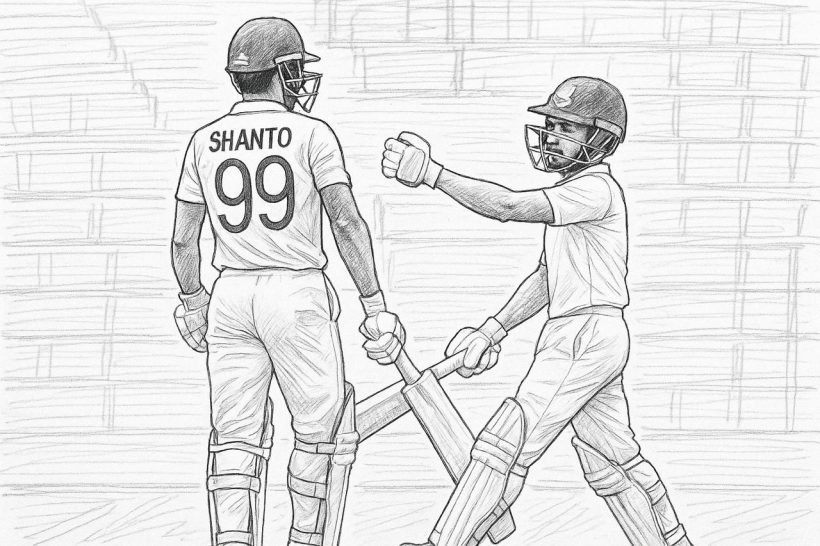Despite the third day of the Sylhet Test being severely curtailed by rain and bad light, it offered enough drama and moments of quality to keep the contest finely poised. Bangladesh reached 194 for 4, thanks largely to their captain’s resilience and some disciplined batting, while Zimbabwe’s bowlers once again asked probing questions. However, both sides also let themselves down in key areas, and those lapses may well prove telling in the final outcome.
The Positives
- Shanto’s calm authority
Najmul Hossain Shanto’s innings stood out as the defining performance of the day. Leading from the front, he showed maturity, patience, and a touch of class to reach a composed half-century. His ability to bat through the disruption of the rain and the loss of partners added significant value to Bangladesh’s innings. - A promising partnership
The unbeaten fifth-wicket stand between Shanto and Jaker Ali is shaping up to be a crucial one. With wickets having fallen at regular intervals, their resistance in the final session helped Bangladesh steady the innings and offered hope of a respectable total. - Muzarabani’s bowling intelligence
Blessing Muzarabani impressed once again with his control and clever use of pace variations. Despite bowling with a slightly shortened run-up, he maintained his effectiveness, using short deliveries to great effect. His dismissals of Mahmudul Hasan Joy and Mushfiqur Rahim were earned through persistence and accuracy. - Nyauchi’s impactful spell
Victor Nyauchi’s clever use of the short ball to dismiss Mominul Haque was a reward for consistency. His ability to extract bounce and discomfort even set batters proved valuable in a phase where Bangladesh had begun to rebuild. - Sound captaincy from Ervine
Craig Ervine’s tactical awareness was evident in his bowling changes, particularly the reintroduction of Muzarabani before the tea break, which led directly to Mushfiqur’s dismissal. His catch at first slip was also sharp and well-judged. - Bangladesh’s attacking intent
Despite losing the first three hours to rain, Bangladesh added 137 runs in 44 overs—a positive scoring rate that kept the game moving and prevented Zimbabwe from settling into defensive lines.
The Negatives
- Fielding frailties hurt Zimbabwe
Nyasha Mayavo’s second drop of Shanto in the match was a significant miss. The catch was straightforward and, had it been taken, would have changed the complexion of the innings. Such lapses in the field continue to undermine Zimbabwe’s disciplined bowling efforts. - Bangladesh’s short-ball weakness exposed again
Both Mominul and Mushfiqur fell to short deliveries, further highlighting Bangladesh’s recurring issues against pace and bounce. It’s an area of concern that the visitors have targeted successfully and one that needs addressing going forward. - Failure to capitalise on key moments
Zimbabwe had Bangladesh on the ropes at 155 for 4 just before tea, but allowed the game to drift thereafter. They missed the opportunity to seize control of the innings, particularly with overcast conditions and helpful bowling conditions on offer. - Joy’s continued lack of form
Mahmudul Hasan Joy once again failed to make a meaningful score, extending his lean run to 17 innings without a half-century. Despite a few attractive boundaries, he looked vulnerable and eventually fell to a predictable short-ball trap. - Bangladesh’s inability to convert starts
Both Joy (33) and Mominul (47) got in but failed to build substantial innings. These missed conversions not only cost Bangladesh momentum but also increased their reliance on the Shanto-Jaker partnership, placing undue pressure on the middle and lower order. - Zimbabwe’s drop in intensity post-tea
After an energetic effort leading into tea, Zimbabwe’s bowling and fielding lacked sharpness in the final hour of play. The lack of sustained pressure allowed Bangladesh to recover and left the day more balanced than it might have been.
Final Thoughts
With only two days remaining and the weather still a factor, both teams will need to correct their flaws quickly if they are to force a result. Bangladesh will look to stretch their total through the Shanto-Jaker stand, while Zimbabwe must strike early and hold their catches if they’re to maintain their foothold in the contest.
Despite the shortened day, the game remains delicately poised—a testament to the competitive spirit of both sides and a reminder that in Test cricket, even rain-affected sessions can shift momentum.


